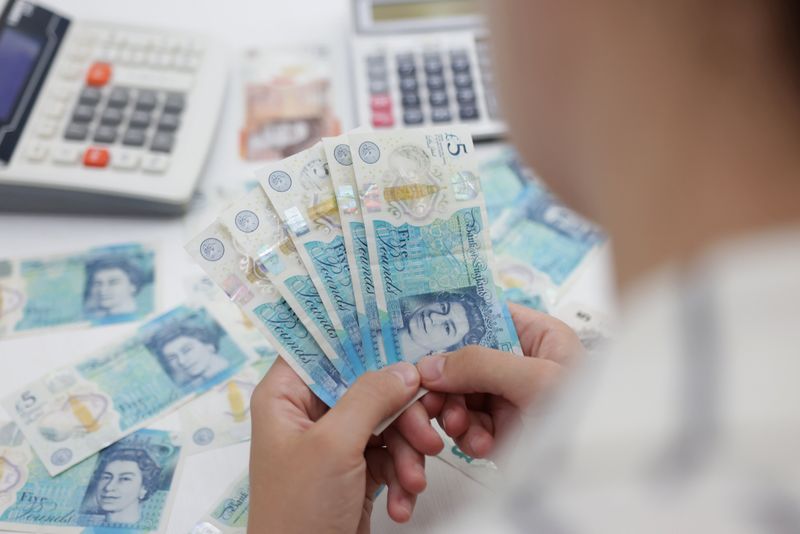By Mike Dolan
LONDON (Reuters) – Tight monetary policy combined with a cash-strapped budget agenda usually results in currency appreciation, with sterling set to rise. But it is far from clear why the British government or the Bank of England now want a rising pound.
The BoE’s decision this week to postpone its second rate cut of the year was labeled an expected ‘non-event’ by many central bank watchers.
But the freeze is more meaningful – and even a little worrying – given what the BoE’s G7 colleagues are doing – not least the Federal Reserve’s excessive half-point rate cut the previous day and the European Central’s second rate cut Bank of 2024 last week.
Keeping the UK policy rate at 5% may simply be a matter of messaging, as the BoE seemed to suggest.
It could be a signal for wage negotiators to limit their expectations, and a call for service sector companies to halt the still high price increases. Or it could simply be reasonable hesitation as the BoE awaits the concrete data it will receive in the new Labor government’s first budget, due to be published next month.
But the BoE’s repeated emphasis on eradicating inflation ‘persistence’ has seen it adopt a markedly more hawkish tone than other major central banks have recently taken – so much so that markets now think the likelihood of a BoE reduction in November is less than 70%, compared to a certainty before the meeting.
And where markets see the UK easing cycle ending is just as harsh.
The implied “terminal rate” is currently around 3.4%, which the central bank expects to reach by the end of next year. That is almost 50 basis points higher than the Fed’s equivalent rate, 150 basis points above those of the ECB and the Bank of Canada and 300 basis points above that of the Bank of Japan.
These policy rate premiums are all higher than in the decade before the global tightening battle in 2022.
It is not entirely clear what justifies this. Are current underlying UK inflationary pressures really that much worse than those in other major economies? Has Britain’s historic vulnerability to inflation resurfaced? Or has Brexit now thrown a spanner in the works?
The market’s longer interest rate horizon also seems confusing when you consider other details of the central bank’s outlook.
In its meeting statement, the BoE cut its GDP growth forecasts for the current quarter, said inflation in the services sector would decline further by the end of the year, and noted that surveys show public inflation expectations returning to levels pre-pandemic, with headline inflation falling short of target. 2%.
The economic drag should be greater if the upcoming government budget remains true to early indications and fiscal policy is tightened with a mix of tax increases and spending cuts needed to close the much-publicized 20 billion pound ($26.55 billion) hole in public finances. fill.
DYING STARS
Sterling seems to love it. The promise of relatively tight monetary and fiscal policies has pushed the pound to its highest level against the dollar in more than two years. And it is just a fraction away from a two-year high against the euro.
The British pound trading index is up more than 3% this year alone and is within striking distance of its highest point since the 2016 Brexit referendum.
Given that trade-related Brexit issues are at least part of Britain’s growth problem, a rising pound can hardly be all that helpful right now.
Even if a strong pound puts downward pressure on imported energy or commodity inflation, it will hardly help the BoE. Her main concern is domestic services and wages, which are largely unrelated to the exchange rate.
The BoE did note that the pound’s effective exchange rate had risen by more than 1% since its last meeting, although it blamed US interest rate shifts and the related dollar movement for most of that.
‘IDIOSYNCRATIC’
If it’s all just a matter of timing, the BoE will eventually have to accelerate its easing, and some economists think so.
“If the government tightens on fiscal policy, we think the Bank will be forced to increase the pace of the austerity cycle to offset the hit to the finances of both households and businesses,” said Gabriella Dickens, economist at AXA Investment Managers. there was an outside chance of two cuts by the end of the year.
And the central bank may have to do significant catching up.
Jefferies economist Modupe Adegbembo said that while there may be “idiosyncratic” reasons for the persistence of UK inflation, pressure on the BoE to make two more cuts this year will increase significantly if the Fed steps up at its next meeting would ease by another 50 basis points.
So the pound may have good reasons to be where it is now, but this strength could quickly evaporate if it relies solely on such a high BoE landing zone.

The opinions expressed here are those of the author, a columnist for Reuters
($1 = 0.7534 pounds)
(by Mike Dolan; editing by Jamie Freed)


